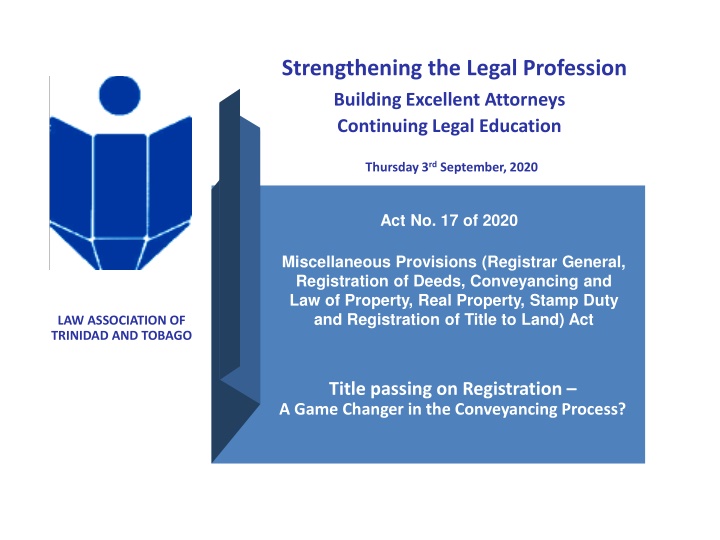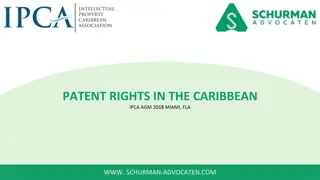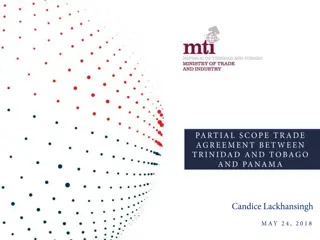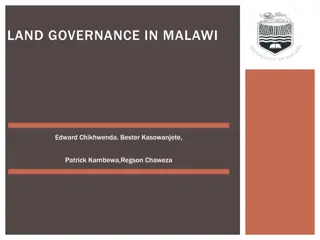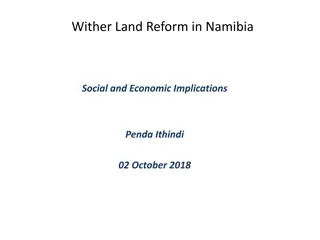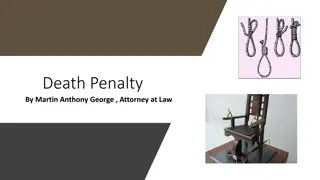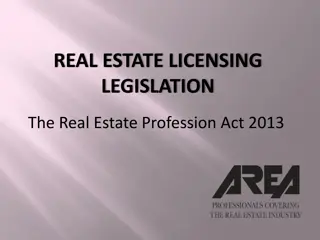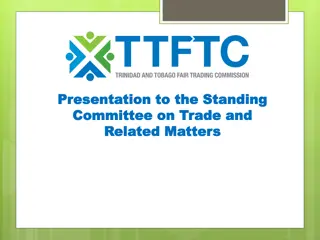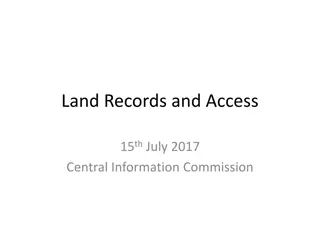Evolution of Land Law Systems in Trinidad and Tobago
Trinidad and Tobago's land law systems consist of the Common Law System and the Registered Land System. The Common Law system governs unregistered land where title passes upon execution and delivery of the deed. In contrast, the Registered Land System confers ownership upon registration and offers certainty of title guaranteed by the State. Proposed amendments aim to align the Common Law system with elements of the Registered Land System by introducing a compulsory registration process for title passing.
Download Presentation

Please find below an Image/Link to download the presentation.
The content on the website is provided AS IS for your information and personal use only. It may not be sold, licensed, or shared on other websites without obtaining consent from the author.If you encounter any issues during the download, it is possible that the publisher has removed the file from their server.
You are allowed to download the files provided on this website for personal or commercial use, subject to the condition that they are used lawfully. All files are the property of their respective owners.
The content on the website is provided AS IS for your information and personal use only. It may not be sold, licensed, or shared on other websites without obtaining consent from the author.
E N D
Presentation Transcript
Strengthening the Legal Profession Building Excellent Attorneys Continuing Legal Education Thursday 3rd September, 2020 Act No. 17 of 2020 Miscellaneous Provisions (Registrar General, Registration of Deeds, Conveyancing and Law of Property, Real Property, Stamp Duty and Registration of Title to Land) Act LAW ASSOCIATION OF TRINIDAD AND TOBAGO Title passing on Registration A Game Changer in the Conveyancing Process?
Overview of two systems of land law in Trinidad and Tobago There are two systems of law under which land is held in Trinidad and Tobago. The Old Law or Common Law System- this system is governed by the Conveyancing and Law of Property Act Chapter 56:01 - In T&T 80% of land falls under this system The Registered Land System governed by the Real Property Act Chapter 56:02 ( RPA )
Overview of two systems of land in Trinidad and Tobago Passing of Legal Title The Common Law system (unregistered land): Title passes on execution and delivery of the deed e.g. vendor receives purchase price or consideration and delivers deed to purchaser. Title passes at this stage (with limited exceptions e.g. deed of gift). In other words a deed does not need to be registered in order for title to pass. Unregistered title is not guaranteed by the State.
Overview of two systems of land in Trinidad and Tobago Passing of Legal Title Registered land/ RPA System: Under this system registration confers ownership or title passes on registration and endorsement of an instrument on the Certificate of Title ( COT ). There is certainty of title. As distinct from unregistered land on completion, the purchase or mortgagee will have custody of the COT. Control of the COT offers a high degree of protection to the purchaser/mortgagee for the period between completion of the transaction and registration of the instrument as no instrument transferring an interest can be lodged for registration without the duplicate COT. Registered title is guaranteed by the State
The effect of the proposed amendments contained in Act No 17 OF 2020 ( The Act ) - PASSING OF TITLE The effect of the proposed amendments would be to import a basic precept of a registered land system into a common law system by title passing only upon registration. This procedural change in the passing of title completely overhauls the system of Common Law conveyancing practice by introducing a compulsory registration system which, on the face of it, appears to be similar to that which exists under the RPA, but which is not accompanied by the same indefeasibility of title or compensation for loss as prevails under the RPA.
SECTIONS OF THE ACT RELATING TO THE PASSING OF TITLE: Clause 4(d) of the Act by which section 3 of the Registration of Deeds Act Chap. 19:06 ( the RDA ) is amended. This section introduces the new legal term of a registrable document at section 3(2) which stipulates that every registrable document executed in T&T or elsewhere shall in addition to all other requirements of this Act, be registered under this Act in order to be valid and effectual in law for all purposes, including the creation, transfer or conveyance of land. (emphasis added)
SECTIONS OF THE ACT RELATING TO THE PASSING OF TITLE: What is a Registrable Document? The new Section (2A) of the RDA provides as follows: (2A) For the purposes of Parts IV and V registrabledocument means a written instrument to create, transfer or convey any interest in land and includes every (a) conveyance of land required to be by Deed and registered under section 10 of the Conveyancing and Law of Property Act; (b) instrument to be registered under the Real Property Act; (c) Deed of assent; (d) Deed of gift or settlement; or (e) instrument of trust, but does not include (f) a contract or agreement for the sale or other disposition of land including a Deed of Agreement for sale; or (g) such other document as the Minister may by Order prescribe.
SECTIONS OF THE ACT RELATING TO THE PASSING OF TITLE: When does a Registrable Document take effect? The introduction of Section 3(2) of the Registration of Deeds Act requires the registration of every registrable document in order to be valid and effectual in law for all purposes, including the creation, transfer or conveyance of land . The words valid and effectual in law are considered to be vague and unclear and could seem to not recognize the equitable interest in the property obtained by a Purchaser on even signing of a sale agreement and paying a deposit towards purchase of the property.
SECTIONS OF THE ACT RELATING TO THE PASSING OF TITLE: Uncertainty created by Section 15D(1) Section 15D(1) requires that an Attorney-at-Law who prepares a registrable document shall ensure it relates to a contract or agreement for sale that is registered in accordance with Section 15B or 15C otherwise the registrable document shall be voidable (Section 15D(3)). It is unclear Who is entitled to void the registrable document?; What would be the consequences of such action?; Whether this result in a break in the chain of title to the detriment of subsequent title holders e.g. mortgagees?
SECTIONS OF THE ACT RELATING TO THE PASSING OF TITLE: Present framework: The current system under the CLPA (before amendment) is that the legal title of the Vendor in property passes to the Purchaser when the deed of conveyance is signed and delivered. Simply put, delivery occurs when the deed is executed AND the Purchaser has paid the Vendor for the property in full. At that moment, legal title passes to the Purchaser who can now rely on the executed unregistered deed as evidence of his legal ownership of the property. Registration determines priority as a registered deed will take priority over an unregistered one.
SECTIONS OF THE ACT RELATING TO THE PASSING OF TITLE: Proposed changes: Under the proposed legislation a deed must be registered in order to be valid and effectual in law for all purposes including the creation, transfer or conveyance of land. The Purchaser will obtain only an equitable title and the deed will have no effect in law until registered. Questions will clearly arise as to what are the rights and liabilities of the parties in the intervening period between the execution of the deed, payment of the purchase price and delivery of a deed by the Vendor to the Purchaser and the actual registration of the deed with the Registrar General s Office referred to as the registration gap . There are many instances in which a deed cannot be registered as soon as the matter is completed which may not be due to the fault of either the Purchaser s Attorney or the Mortgagee s Attorney (where there is a related mortgage).
TIME FOR REGISTRATION OF A REGISTRABLE DOCUMENT The recent amendments to the new sections 15F and G of the RDA require registration of a registrable document within 12 months of its signing and delivery or of its delivery out of escrow . Unless registration occurs within 14 days of the execution of the deed by all parties, a notice of execution must be filed in accordance with section 15E of the RDA
SPECIFIC EXAMPLES OF THE POSSIBLE IMPACT ON THE CURRENT CONVEYANCING PRACTICE 1. Where a property owner resides or works abroad and the documents are executed outside of Trinidad and Tobago. In a situation where the Vendor is abroad once the deed is executed and the purchase price paid the Purchaser is under the CLPA deemed to be the legal owner. In many transactions, practitioners experience situations which involve executions out of the jurisdiction which inadvertently causes delays in registration as a result of the time frame involved in receiving the deed (especially if not sent by an international courier but by registered post) or further if the deed has to be returned to the party residing abroad and the Notary or Witness cannot be readily located. Further delays are often occasioned if the Attorney failed to detect a minor discrepancy in the Witness Declaration or Notarial Certificate and the deed is rejected for registration.
SPECIFIC EXAMPLES OF THE POSSIBLE IMPACT ON THE CURRENT CONVEYANCING PRACTICE 2. Vendor dying during the registration gap. Is the deed effectual in law? Under the existing legislation a deed executed by a Vendor who subsequently dies prior to registration would already take effect in law to pass title to the Purchaser. The Deed will still be submitted for registration merely to put the public on notice that title has passed. If a Deed will now only take effect upon registration and an Attorney acting for the Purchaser who is either not aware of the passing of the Vendor after the sale is completed or is not minded to put the Registry on notice of this fact and proceeds to register the Deed, what would be the effect of this Deed? How will such a situation affect the title to the property or any mortgage taken as security?
SPECIFIC EXAMPLES OF THE POSSIBLE IMPACT ON THE CURRENT CONVEYANCING PRACTICE 3. Vendor becoming incapacitated during the registration gap. Is the deed effectual in law? A similar concern is where a Vendor has a progressive disease of the mind such as Alzheimer s and has executed the Deed during a lucid interval as witnessed and confirmed by a doctor. Where the deed is subsequently submitted for registration, will further confirmation of the Vendor s state of mind be required at the time of registration if legal title will only pass at this point? Once again how will this affect the title to the property or any mortgage taken as security?
SPECIFIC EXAMPLES OF THE POSSIBLE IMPACT ON THE CURRENT CONVEYANCING PRACTICE 4. Purchaser dying during the registration gap. Similarly, as with point No. 2, under the existing legislation legal title would pass to the Purchaser upon execution and delivery of the Deed. However, under the proposed legislation where legal title only passes upon registration and a Purchaser dies during the registration gap the question now arises as to what title did the Purchaser die possessed of? Consequently, can his personal representative properly execute an Assent if it is premised that he died before acquiring legal title? If this situation arises and an Assent is executed, will it therefore mean that the Assent only passed equitable title to the beneficiary and further steps will have to be taken with the said Vendor (if he can be found) to obtain legal title? Once again how will this affect the title to the property or any mortgage taken as security?
SPECIFIC EXAMPLES OF THE POSSIBLE IMPACT ON THE CURRENT CONVEYANCING PRACTICE 5. The question of when does time run for the registration of a statement of charge when a company executes a mortgage over its real property Under Section 251 of the Companies Act Chap. 81:01 a statement of charge must be registered within 30 days of the creation of the charge which is the date the statement of charge and corresponding mortgage is executed. Where a Company executes a Deed of Mortgage and the mortgage will not take effect in law until it is registered, it follows that the statement of charge which evidences that a charge was created ought not be filed until the mortgage can be registered. This conflicts with the current provision in the Companies Act 81:01. Where the Mortgage will only take effect on registration but the legal title will become retroactively vested in the mortgagee at the date of the Mortgage and there is a delay of over thirty days in registering the mortgage, how will this affect the timeframe in which the statement of charge is to be filed? The filing of the Statement of Charge is critical to the perfection of a mortgagee s security and its position as a secured creditor
SPECIFIC EXAMPLES OF THE POSSIBLE IMPACT ON THE CURRENT CONVEYANCING PRACTICE Common examples of when the registration of the Mortgage may be delayed: The Mortgage is executed however there is a delay in the payment of stamp duty. There is an assignment of the Mortgage and the transferring bank delays in providing the settlement figure of which it is to be paid. The Mortgage would be fully executed pending this settlement figure. In past transactions, the Companies Registry took the approach that the statement of charge ought to be filed at the date the Mortgage was dated and not at the date the settlement figure was paid. The proposed legislation does not address the problem where the mortgage will not take effect in law until registration and a statement of charge is to be filed prior to this date.
SPECIFIC EXAMPLES OF THE POSSIBLE IMPACT ON THE CURRENT CONVEYANCING PRACTICE The position of Lenders Where the Purchaser obtained a mortgage to finance the purchase price, the lending institution is protected by the fact that immediately on delivery of the deed (such as by payment of the purchase price) the legal title in the property passes to the Purchaser who can then in turn convey the legal title in the property to the lending institution to secure the mortgage. The current common law framework therefore facilitates purchase of property via mortgage as both purchaser and mortgagee have security in title passing immediately on delivery of the deed. Currently a mortgagee can exercise all powers as contained in an unregistered deed of mortgage.
SPECIFIC EXAMPLES OF THE POSSIBLE IMPACT ON THE CURRENT CONVEYANCING PRACTICE The position of Lenders Under the Act, the legal title will not pass until the deed is registered and as such the purchaser and the mortgagee will only have an equitable interest in the property - the nature of which is yet to be determined as the Act requires registration of the deed to be valid and effectual in law and are we to conclude therefore enforceable? In such circumstances, where a lending institution had lent funds for the purchase price, is it s security for funds disbursed to pay the purchase price not recognizable until registration occurs ? It may have an equitable interest but would need a Declaration of the High Court that such equitable interest exists and will be forced to seek the redress of the court in order to exercise the rights of a mortgagee which can only be the holder of a legal mortgage.
SPECIFIC EXAMPLES OF THE POSSIBLE IMPACT ON THE CURRENT CONVEYANCING PRACTICE The position of Lenders Therefore, the risk exposure having been increased the mortgagee may not wish for their funds to be disbursed until the mortgage is a legal one. A lender may be reluctant to proceed with disbursement of funds unless and until the deed of conveyance in favour of its customer (mortgagor) has been stamped and registered. It is hard to imagine a scenario whereby a vendor would deliver the conveyance to a purchaser for registration without having received the purchase consideration and consequently a Purchaser is unlikely to be let into possession. A true catch-22 scenario.
SPECIFIC EXAMPLES OF THE POSSIBLE IMPACT ON THE CURRENT CONVEYANCING PRACTICE The position of Lenders It should be noted that the legislation introduces the concept of retroactive vesting or the principle of relation back which purports to artificially bridge that gap by providing that once registered the effective date of the deed shall be the date of the deed i.e. when the deed is eventually registered, the legal title becomes retroactively vested in the Purchaser as at the date on the deed. This is similar to what happens with lands held under the Real Property Act (save for the retroactive vesting) where title passes only on registration. However, the two systems are not analogous and are fundamentally different.
SPECIFIC EXAMPLES OF THE POSSIBLE IMPACT ON THE CURRENT CONVEYANCING PRACTICE The position of Lenders The RPA is based on the Torrens System which is a registration of title system or registered title system whereas the Common Law system is a registration of deeds system for unregistered land in which title is derived from the deeds and registration is effectively notice. Registration under the common law system as it exists now and even under the proposed legislation will NOT guarantee title whereas registration under the RPA guarantees title. The Act refrains from providing any of the guarantees and insurances that exist under the RPA in which the State certifies the title and the endorsements on the Certificate of Title are conclusive evidence of all interests in the land.
SPECIFIC EXAMPLES OF THE POSSIBLE IMPACT ON THE CURRENT CONVEYANCING PRACTICE The position of Lenders Importantly, it is also unclear what effect this new system will have on priority of interests in Common Law transactions particularly as these provisions are such a drastic departure from established law and, as there are no clear provisions set out in the legislation, in the event of a dispute, the parties will have to seek clarification from the Court. The Court will be tasked with interpreting the provisions in the Act without the benefit of referencing established authorities on points of law. As already mentioned, under the RPA system, parties are afforded further protection as the production of the Duplicate Original Certificate of Title is necessary for registration and creation of any interest.
SPECIFIC EXAMPLES OF THE POSSIBLE IMPACT ON THE CURRENT CONVEYANCING PRACTICE The position of Lenders Further specifically with respect to mortgages, the borrower in a transaction does not convey lands unto the mortgagee as under the RPA the mortgage is created by means of a charge in the property which circumvents the need for legal title to be transferred to the mortgagee which must be done under the common law. As such, completion would not usually take place without the Duplicate Original Certificate of Title being delivered at the time of payment of the purchase price.
SPECIFIC EXAMPLES OF THE POSSIBLE IMPACT ON THE CURRENT CONVEYANCING PRACTICE Use of Stakeholder/Escrow Agents It is also useful to point out that given title will only pass upon registration and in order to mitigate some of the risks, Stakeholders or Escrow Agents may now be required to hold all monies payable including the proceeds of mortgage loans in escrow pending the registration. Difficulties may arise in establishing escrow accounts with the Banks and this could place less established practitioners at a disadvantage.
General Points to Consider The Act constitutes a fundamental and radical departure from established practice and the common law in the sphere of conveyancing and property law and would benefit from further and more mature consideration by the Law Review Commission and the Law Reform Commission. Potential avenue for fraud. A Vendor through effective time management and manipulation could execute two separate deeds and then the question of whose deed takes priority in such a situation will be totally dependent on who races to the finish line first as all the previous case law on priorities are now completely irrelevant. No similar legislation was introduced in any other Common Law jurisdiction in compliance with their AML/CFT/PF obligations and the provisions of the Act are in vast contrast to legislation in many other Common Law jurisdictions. The focus there being instead to simplify and modernize land law .
